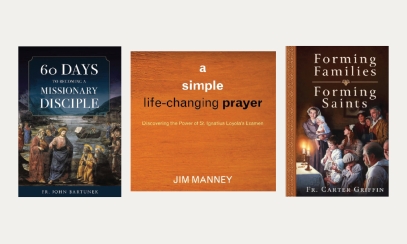FAITH Review of Books - June 2025
The Practical Spirituality of St. Josemaria Escrivá
The Practical Spirituality of St. Josemaria Escrivá
Getting your Trinity Audio player ready...
Holiness for Everyone: The Practical Spirituality of St. Josemaria Escrivá
By Eric Sammons
St. Josemaria Escrivá, founder of Opus Dei, lived in an era that tended to believe the pursuit of sanctity should be left to cloistered or the consecrated. In contrast, Escrivá stated that the invitation to holiness was — as Vatican II would later proclaim — a universal call for believers. This book is packed with Escrivá’s wisdom about just how to live that call in the complexities and distractions of our daily life. The author skillfully highlights the key elements of St. Josemaria’s “spirituality of ordinary life” with anecdotes from the life and writings of the saint. Each chapter concludes with a “Read-Meditate-Pray-Contemplate” page with resources to help consolidate its message.
Recommended for busy people seeking to build a Christ-centered rule of life.
What Happens at Mass
by Abbott Jeremy Driscoll OSB
This is a careful and reverent chronological explanation of the composition of the Mass. It’s filled with helpful comments on how we are meant to understand each part of the ritual both on a theological and human level.
It’s also an invitation for the reader to see afresh the truly wonderful gift we have in the Mass. Abbott Driscoll reminds us that in each Mass an event is being proclaimed: “the death of Jesus of Nazareth and his resurrection from the dead.” Its telling “causes what once happened to be present now.” This mystery which believers are invited into happens at every Mass, humble or prestigious.
Recommended for those working with new Catholics or on OCIA programs, and for those who feel their Catholic education lacked a solid catechesis of the Mass.
Mere Christianity
by C.S. Lewis
Lewis’ book on the core beliefs of Christianity, remains a classic read. The book is compiled from material he presented on radio during World War II, (broadcasts unfortunately lost by the BBC.) In his preface, Lewis explains what he means by “mere” (essentially the core beliefs held by almost all Christians through history) and why he has chosen this approach to presenting the Gospel. Lewis’s imaginative illustrations and attractive conversational style combine to make the book easy to follow and consistently thought-provoking. The four sections, or “books,” deal with the notion of right and wrong, Christian belief, Christian behavior, and the doctrine of the Trinity. Anyone who has read and enjoyed Lewis’ children’s fiction (Narnia chronicles) will love this chance to get to know more about their creator.
Recommended for new Christians, as a graduation gift, and for anyone building a library of Christian classics.


